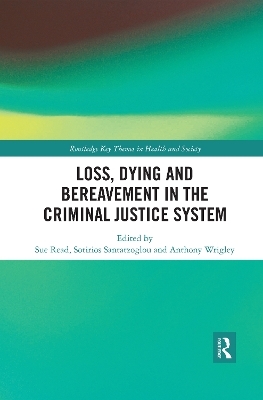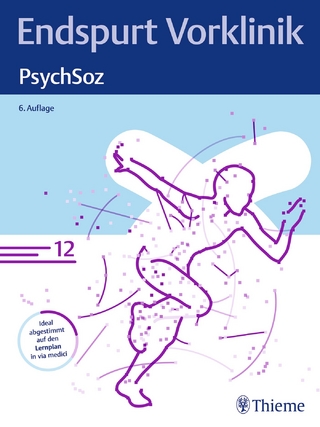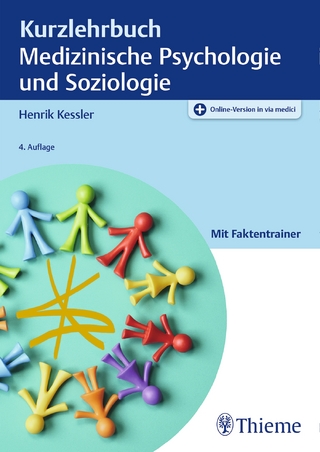
Loss, Dying and Bereavement in the Criminal Justice System
Routledge (Verlag)
978-0-367-45751-8 (ISBN)
Life is characterised by movement, change and development, including transitions, losses and grief. People experiencing loss must learn to accommodate it and, sometimes, relearn new roles. Whether the offender is accommodating general loss (such as transition), the loss of others or facing their own impending death, the bereavement process can become a particularly complicated experience for those involved in the criminal justice system.
Criminal offenders may be excluded from participating in grief rituals and may receive few explicit opportunities to talk about a loss they’ve experienced, sometimes resulting in disenfranchised grief. Informing thinking around assessment, care, and support procedures, this volume seeks to bring together a range of perspectives from different disciplines on crucial issues surrounding the impact of loss, death, dying and bereavement for criminal offenders. The book will explore inherent challenges and responses to the criminal justice system by considering to what extent offenders’ loss, death, dying and bereavement experiences have been - or should be - recognised in policy and practice. The first section considers theoretical approaches to loss; the next section translates these issues using professional perspectives to explore practical applications; and the final section introduces an offender perspective.
Through identifying challenges and consolidating evidence, this multidisciplinary book will interest researchers interested in loss and bereavement in vulnerable communities, concepts of disenfranchised grief, end-of-life care and mental healthcare in the criminal justice system.
Sue Read of Professor of Learning Disability Nursing and Chair of the Palliative and End of Life Care Research Group at Keele University, UK. Sotirios Santatzoglou is Teaching Fellow in Law at Keele University, UK. Anthony Wrigley is Senior Lecturer in Ethics at Keele University’s Centre for Professional Ethics, UK.
SECTION I: Appreciating dimensions of loss, death, dying and bereavement
1. Disenfranchised communities.
2. Death, dying and maintaining hope: ethical tensions and responsibilities in the prison setting.
3. ‘Sympathy to the offender’: The Hobbesian account and the sympathy to the offender as an issue in end of life care PART A.
4. Loss at the end of life: Palliative care in prisons.
5. Deaths in sites of state confinement: A continuum of routine violence and terror.
6. Civil and social death: Criminalisation and the loss of the self.
SECTION II: Professional development of bereavement and end of life practice.
7. Bereavement and loss at the sentencing stage.
8. Criminal justice context and voluntary bereavement support.
9. ‘Sympathy to the offender’: The Hobbesian account and the sympathy to the offender as an issue in end of life care PART B.
10. Working in the shadows: Reflections on counselling in prison and hospice settings.
11. The Evolution of Change: Factors involved in the design and delivery of a therapeutic service within the confines of a custodial setting.
12. Offenders and the challenges of palliative care in the community setting.
SECTION III: Insights to inform reflections for ongoing support
13. Sorrow, loss and the transition of chronic disease to end of life care in prisons.
14. The impact of loss on mental health: Implications for practice.
15. Mourning in custody: Dealing with sudden death.
16. Freedom to grieve: a child and parent perspective.
17. Beyond loss of liberty: How loss, bereavement and grief can affect young men’s prison journeys.
18. Grief, chaplaincy and the non-religious prisoner.
| Erscheinungsdatum | 13.12.2019 |
|---|---|
| Reihe/Serie | Routledge Key Themes in Health and Society |
| Zusatzinfo | 3 Tables, black and white; 2 Line drawings, black and white; 2 Illustrations, black and white |
| Verlagsort | London |
| Sprache | englisch |
| Maße | 156 x 234 mm |
| Gewicht | 349 g |
| Themenwelt | Sachbuch/Ratgeber ► Gesundheit / Leben / Psychologie |
| Studium ► 1. Studienabschnitt (Vorklinik) ► Med. Psychologie / Soziologie | |
| Studium ► Querschnittsbereiche ► Prävention / Gesundheitsförderung | |
| Recht / Steuern ► Strafrecht ► Kriminologie | |
| Sozialwissenschaften | |
| ISBN-10 | 0-367-45751-2 / 0367457512 |
| ISBN-13 | 978-0-367-45751-8 / 9780367457518 |
| Zustand | Neuware |
| Haben Sie eine Frage zum Produkt? |
aus dem Bereich


